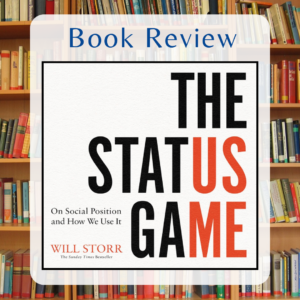
The Status Game: On Social Position and How We Use It
by Will Storr
Book Review by Kristine Madera
 Will Storr’s The Status Game posits that regardless of culture the core of human nature is a drive for status in the groups we are part of, and that success, meaning, and happiness come from succeeding in the status game. Storr likened status to a nutrient as essential as sunshine and showed how high status correlated with better health and a longer life, and how a drop in status correlated with an earlier death in British civil servants. I’ll admit this opening was rather a downer.
Will Storr’s The Status Game posits that regardless of culture the core of human nature is a drive for status in the groups we are part of, and that success, meaning, and happiness come from succeeding in the status game. Storr likened status to a nutrient as essential as sunshine and showed how high status correlated with better health and a longer life, and how a drop in status correlated with an earlier death in British civil servants. I’ll admit this opening was rather a downer.
NOTE: Check out Will Storr’s interview about The Status Game with Jordan Harbinger below the Imagineering Protopia section!
If the status game sounds like a downer to you, too, take heart. Status isn’t (only) about socioeconomic status, studies show that it’s about cultivating admiration and respect in the local groups that are important to you. Different cultures and groups have different status indicators, from the most impressive job title to the biggest yam. Storr says, “Groups of people gather together, agree what symbols they’re going to use to mean ‘status’, then strive to achieve it.”
The three ways to acquire status, according to Storr are through dominance or coercion as with armies or organized crime, through virtue or goodness as with religions or virtue signaling, and success or winning a specific game with specific rules as with corporate culture or in sports. The drive for status has fed both civilizations and cults, heroism and abuse, alliances and wars, depending on the game and how it’s played.
So then why don’t low-status people rebel? They do sometimes. When the game everyone is playing pays off in predictable ways, low-status people can be manipulated into continuing to play through stories that promise a better life later, like, say, after death, if they toe the line now. But when the game stops working, Storr says, revolutions gain ground.
If the status game seems depressingly dog-eat-dog, Storr says that personal status in any group can come from being warm, sincere, and competent. These traits signal that you accept people as they are, are not going to fight them for status, and you can contribute something meaningful to the group.
Other tips for winning the game of a happy life as well as the status game are to elevate others with small moments of prestige, to play many games and know which are the most important for you to build status in, stop judging, and start empathizing. Be different and distinct in who you are and what you do. Storr leaves us with a cheerful reminder that the game of life and the status game play both by rules we make up and that the key to good mental and emotional health is not to take either too seriously.
NOTE: See Will Storr’s interview about The Status Game with Jordan Harbinger at the end of the next section.
Imagineering Protopia
I read this book while pondering how to structure a protopian world for a YA speculative fiction series I’m working on. One feature of dystopian novels (and authoritarian/fascist states) is that there is only one game and to have a decent life you have to play that game, like having to belong to the Communist party in the Soviet Union or become a Nazi in 1930s Germany to gain status and have a comfortable life.
Our worldwide game has increasingly required the acquisition of money to survive—making money the only game that matters. Other kinds of status are tied to the money game—the monetary success of your employment or business, political power, flashy cars and massive summer houses, the money to fund a movement or cause, etc. One feature of the money game as it is played now is, like in the Monopoly game, to bankrupt the other players—okay, maybe not literally since businesses need paying customers and politicians need donations. But a primary feature of wealth accumulation and increasing shareholder value in our current winner-take-all game economically sucks dry the middle and lower socioeconomic classes and blames them for their plight.
If this were a Monopoly game, it would just be tedious. But the game is tied to survival—housing, food, health care, education, and more. It requires everyone to play the game, whether through legal or illegal means. To me, this is insane. It also carries within it the seeds of its own scorched Earth destruction.
It’s nice to think that freed from the profit-at-all-costs money game, everyone would play nicely together and get along. But Storr makes a strong case that people are innately driven to find status in whatever games they participate in.
So I’ve been exploring how to build status in the many games at play in my speculative world. In it, people can access games that are meaningful for them and have the opportunity to excel and build status in a way that improves the world rather than rips at its seams. I agree with Storr’s assertion that personal status in any group can come from being warm, sincere, and competent—qualities I’ve cultivated and benefited from throughout my life. My speculative world incentivizes these qualities as a way to expand group cooperation.
As our current world comes apart at the seams, I wonder how we can reorder our games to incentivize those qualities even as we expand the skills and knowledge we need to individually and collectively thrive. If we can do that, we may have stumbled into a way to play nicely and get along.

About Kristine
Kristine Madera is a #1 bestselling Amazon author, novelist, hypnotherapist, and pro-topian with a passion for helping people better themselves and the world. Informed by global travel, teaching abroad, and a stint as a Peace Corps Volunteer, Kristine believes that everyone plays a part in imagining and creating our collective future.
Volunteering at Mother Teresa’s Home for the Dying in Calcutta inspired her novel, God in Drag. She birthed her upcoming novel, The Snakeman’s Wife, as a Peace Corps Volunteer in Papua New Guinea.
Read the first chapter of God in Drag HERE
